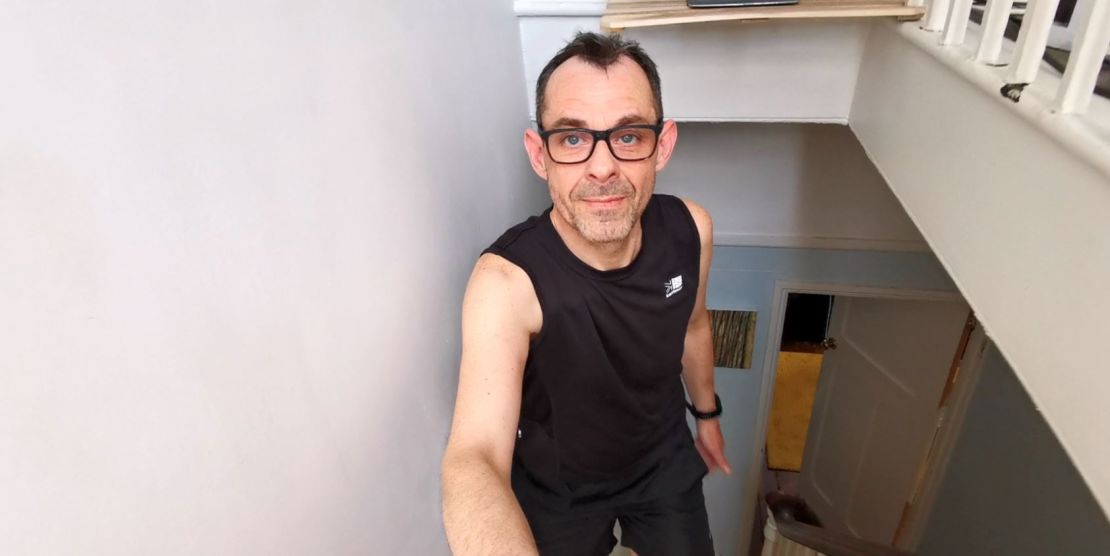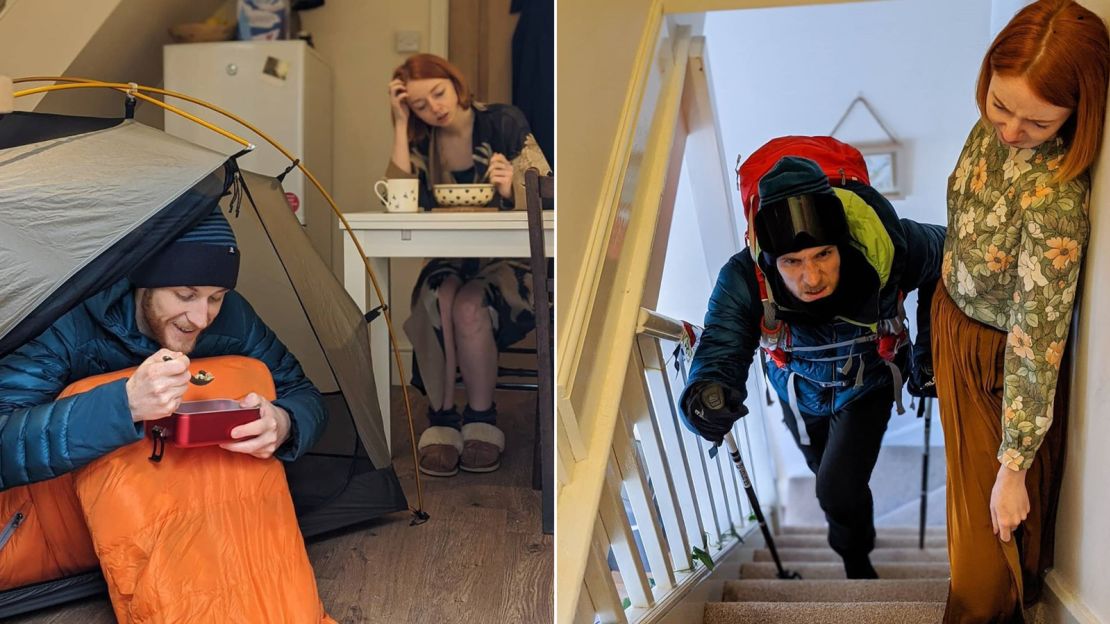When the going gets tough, the tough get going. Or in the case of John Griffin, the tough get walking. There are 30 steps in his three-story house and for a minimum of six-and-a-half hours every day he’s been going up and down them.
Four days later after 1,363 trips to the top floor of his house – 40,846 steps in all – he’d ascended the height of Mount Everest – approximately 8,850 meters.
“The mental side of seeing the same staircase again, again and again, that really did drain me,” the 53-year-old Griffin, who lives in Shoreham-on-Sea in southern England, told CNN Sport.
In the process, he raised money for food bank charity, The Trussell Trust, after witnessing a lack of supplies being donated at his local supermarket.
His indoor adventure was initially inspired by one of his early morning daily tasks.
“I live in quite a tall Georgian house and I was taking a cup of tea up to my wife and I said by the time this lockdown is over, it will feel like I’ve climbed Everest,” he told CNN Sport.
“I was more focused on trying to get some awareness and raise some money rather than how I was going to do it.”
READ: Premier League stars launch initiative to help NHS

Roof terrace summit
When Griffin did eventually reach the top floor of his house for the final time he celebrated with his wife and daughter by flying a Union flag from the roof terrace.
He measured his progress by using a special adapted tracker, stopping for a break every time he climbed the height of the UK’s tallest building, The Shard (1,016 ft).
“It was great, I didn’t let myself go out on the roof terrace so I was saving that for something to look forward to. Like in any real challenge, it’s about setting little goals,” he said.
With the launch of his new vegan delivery business put on hold because of the pandemic, Griffin is now spending the majority of isolation homeschooling his daughter and doing all he can to support his wife – an NHS GP working on the coronavirus crisis’ frontline.
He hopes his novel initiative provided other people with a bit of respite from the current situation but admits he was surprised by the international interest in his feat.
“It’s a sign of the times that people are looking for things to distract themselves with. Not following the news constantly can be an important part of mental well-being,” added Griffin.
“Hopefully it was an amusing distraction for people if nothing else.”

Keeping positive
Griffin is not the only Briton taking quarantine one step at a time.
A keen endurance runner, Rory Southworth also found himself looking for creative cardio alternatives during lockdown.
So he climbed the height of Ben Nevis, the tallest peak in the UK, on the backsteps of his garden before turning his attention to scaling the the height of Snowdon, the tallest mountain in Wales, by using just the first step.
“People started being quite interested in this stuff that they could do and it was stuff that they wanted to get involved in,” Southworth told CNN Sport from his home near the Lake District, UK.
“So I thought I’d set up a group that would, over five days, do the Everest base camp trek.
“It’s a trek that a lot of people know, the elevation on it is fairly accessible and you can do the height that you’d have to do each day before breakfast, if you wake up early enough.”
READ: ‘I’ve got a private island,’ says Dana White as he plots UFC event
Emotional moments
Using Instagram, the 27-year-old brought together a group of 30 people to take on the challenge of climbing the 5,364 meters.
By keeping track of their progress online, Southworth was able to encourage his new-found friends to meet their daily requirement of steps – whether they were climbing a staircase, garden steps or simply a ladder.
As well as keeping physically active during the quarantine period, the virtual trek also helped those taking part psychologically.
Some of the climbers had recently lost their jobs, were key workers in stressful roles or were struggling to adapt to life in isolation.
“For a lot of us in the outdoor community and who do a lot of outdoor sports, our mental health is intrinsically linked to our sport,” said Southworth, admitting the trek was an intense emotional experience for some.
“We’re not really used to dealing with stresses without having that ability to expel it through physical activity in nature and wild places.
“So having something where we have a focus, giving ourselves some purpose, and having a team support us through this was very important.”
Southworth is keen to continue helping people stay active during the lockdown and is already organizing another challenge where teams race up a different virtual mountain every morning.
“My plan is to keep bettering these challenges, keep improving the concepts and keep involving the teamwork aspect to really try and push positivity into the outdoor community,” he added.



















